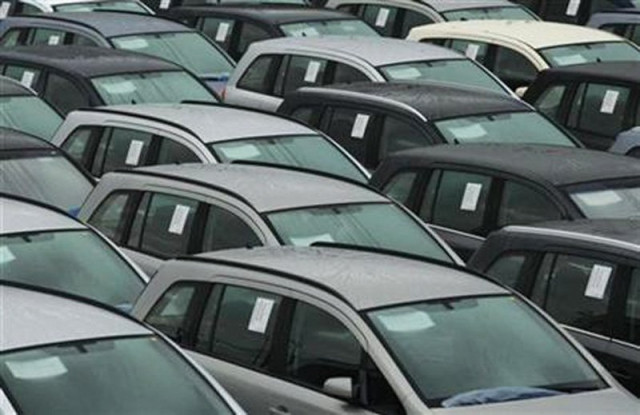Automobiles: Govt refuses to slap ban on import of used cars
Upcoming auto policy could facilitate new market players

Prices of sedans in Pakistan were lower compared to India but prices of hatchbacks were higher compared to other countries. PHOTO: REUTERS
The government has turned down the demand of local carmakers who sought imposition of a ban on the import of used cars in a bid to facilitate the consumers.
“Local carmakers want a ban on the import of used cars to strengthen their monopoly but the government has rejected it,” an official said, adding the manufacturers had some reservations about the upcoming auto policy. The Privatisation Commission chairman has been tasked with addressing their concerns.
According to officials, the government will also introduce a tariff protection plan for the new entrants in the automobile manufacturing sector in the auto policy to break the monopoly of existing players.
Stakeholders have proposed that the government should introduce a lower entry threshold for new investments, create an enabling tariff structure for development and rationalise the auto import policy.
The Economic Coordination Committee, in a meeting held on October 2, 2013, suggested that they may give tariff protection for five to seven years to the new entrants to break the existing monopoly of players who are selling obsolete technology at high prices.
Officials said the government wanted to create an environment of competition by bringing more players into the auto industry, which may result in a decline in vehicle prices.
However, some say local carmakers were operating at a low capacity due to lower demand for cars in the country. But others argue that they were operating at such a capacity in order to keep prices high with the law of demand and supply.
Prices of sedans in Pakistan were lower compared to India but prices of hatchbacks were higher compared to other countries.
Auto sectors of other countries have many players that increase competition due to which prices are kept low. But in Pakistan, where a few manufacturers are dominant, the cost to the consumer is generally high.
The decision to introduce a new auto policy was taken by the government when it noticed that the incentives had no effect on car prices, as assemblers took the entire advantage. They also earn hefty profits on the advance deposited by consumers for car delivery.
Economic managers in the government have consistently criticised the car assemblers, saying that despite availability of abundant incentives, no commitment made to the government has been met.
The PML-N government wants that the new policy covers the facilities being offered to the auto industry, the need for new entrants, the existing duty structure for import of motor vehicles, standards set by the Engineering Development Board and requirements of a long-term policy framework.
Officials said the government is working on a plan to reduce the time of car delivery so that consumers are not exploited. The assemblers were exploiting the consumers as they were unduly keeping the latter’s advance for several months and earning profits on that before actual delivery.
Not a single car manufacturer in the country had been able to complete its deletion programme even after extension in the timeframe. Moreover, the economic decision-making body had noted that products of the assemblers were costly and based on obsolete technology.
Published in The Express Tribune, January 23rd, 2015.
Like Business on Facebook, follow @TribuneBiz on Twitter to stay informed and join in the conversation.



















COMMENTS
Comments are moderated and generally will be posted if they are on-topic and not abusive.
For more information, please see our Comments FAQ